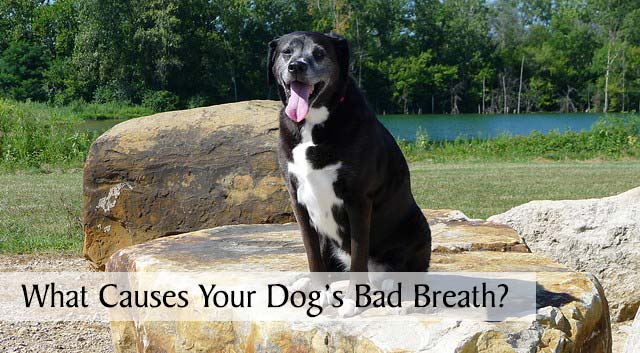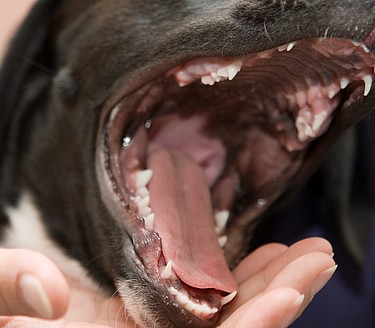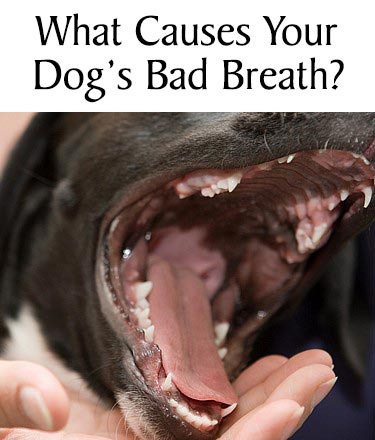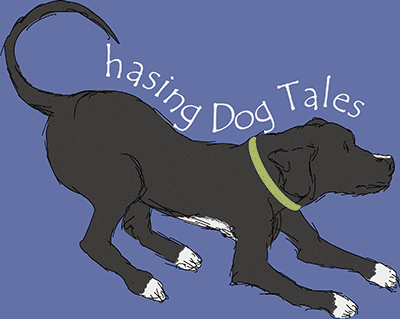 Does your dog have bad breath? When I was growing up, smelling a dog’s stinky breath was considered a normal part of having or being around a dog. We called it “doggie breath” and if we would have heard of someone back then brushing their dog’s teeth everyday, they surely would have been labeled as the “crazy dog lady” of the neighborhood. Today, more dog owners are starting to understand that a dog’s bad breath is usually a symptom of a brewing problem that should be checked out and treated.
Does your dog have bad breath? When I was growing up, smelling a dog’s stinky breath was considered a normal part of having or being around a dog. We called it “doggie breath” and if we would have heard of someone back then brushing their dog’s teeth everyday, they surely would have been labeled as the “crazy dog lady” of the neighborhood. Today, more dog owners are starting to understand that a dog’s bad breath is usually a symptom of a brewing problem that should be checked out and treated.
We’ve all been in that situation when a panting dog comes to you for affection, you reach out to show them some love, then Whew! Their noxious breath forces you to make a quick retreat. The poor dog, despite the sweet smile on their face, the odor doesn’t exactly put you in the mood to cuddle with them, right? Here are some possible reasons for that offensive aroma emanating from your dog’s mouth.
What Causes Your Dog’s Bad Breath
Dental or Gum Disease
With 80% of dogs over the age of three already having gum disease, the odds are pretty good that poor oral hygiene is likely the cause of your dog’s bad breath. Just like with us humans, halitosis can result from the buildup of odor-producing bacteria in the mouth. Without regular oral care, plaque turns into tartar which eventually leads to periodontal disease. Small dogs and brachycephalic (short-nosed) dogs are especially prone to developing dental issues. Besides bad breath, other symptoms of dental and gum disease include red or swollen gums, bleeding gums, changes in chewing or eating habits, pawing at the face or mouth, excessive licking or drooling and loose teeth. Dental or gum disease is the most common disease found in adult dogs and it’s the most likely culprit of persistent bad breath.
Your Dog Ate Something Smelly
Occasional doggy breath can be caused by something stinky your dog ate. If your dog has a habit of raiding garbage cans, eating foul or gross things off the ground or consuming dog or cat feces, you’re probably going to notice their foul-smelling breath afterwards.
Puppy Teething

Puppy Teeth
If your dog is still a puppy, the odor is probably caused by teething which takes place roughly between the ages of 3 to 8 months. You also might notice some small amounts of blood left on their toys after chewing. By the way, this is a great time to start getting your puppy used to the idea of having their teeth brushed.
Diet
Your dog may have bad breath if her diet doesn’t agree with her. Certain foods may cause gastrointestinal upsets with some dogs which can cause foul-smelling breath. Make sure you’re feeding a high-quality food that’s easy to digest and see your vet for recommendations if you think your dog’s food may be causing an upset tummy or bad breath.
Other Illnesses
Some other medical conditions that can cause bad breath include gastrointestinal, respiratory, liver or kidney issues as well as diabetes which produces sweet smelling breath. Issues that are local to the mouth such as sores, tumors, lip fold dermatitis, viral and fungal infections can also be a cause of rank odors.
On occasion, Haley’s had some pretty stinky breath but I can usually determine the cause and resolve her halitosis. Now that you know some causes of your dog’s bad breath, find out How to Get Rid of Your Dog’s Bad Breath.
How often does your dog have bad breath?
Other Posts You Might Find Interesting
 Does your dog have bad breath? When I was growing up, smelling a dog’s stinky breath was considered a normal part of having or being around a dog. We called it “doggie breath” and if we would have heard of someone back then brushing their dog’s teeth everyday, they surely would have been labeled as the “crazy dog lady” of the neighborhood. Today, more dog owners are starting to understand that a dog’s bad breath is usually a symptom of a brewing problem that should be checked out and treated.
Does your dog have bad breath? When I was growing up, smelling a dog’s stinky breath was considered a normal part of having or being around a dog. We called it “doggie breath” and if we would have heard of someone back then brushing their dog’s teeth everyday, they surely would have been labeled as the “crazy dog lady” of the neighborhood. Today, more dog owners are starting to understand that a dog’s bad breath is usually a symptom of a brewing problem that should be checked out and treated.


This was really interesting. Cody sometimes has bad breath but I don’t think it’s a problem at the moment. I’m more concerned about the build up on his teeth, which we’ve tried to get rid of by giving him bones. I’ll check back tomorrow – I’d love to hear how to keep your dog’s gums nice and healthy. Great post!
Great! I’m glad you stopped by and I’ll be posting those breath-freshening tips tomorrow.
This was interesting, thanks for this. Mine rarely have really bad breath, but then again, their teeth and mouths are in brilliant condition.
That’s fantastic, especially since Earl and Ethel are smaller dogs. They do have brilliant smiles. ?
Oral hygiene is so important for dogs and humans. If a dog has bad breath, something is going on and it might be time to check with the vet.
Yes, I’m so glad people are more aware these days about dental care for their pups.
Honey has a healthy mouth and no odor. It’s why I was surprised by my sister getting irritated by Honey’s “hot breath” when she panted.
I guess that’s a thing for some people?
Yeah, I can see that if you’re sitting on the floor and a dog is panting in your face, especially if you’re already hot because it’s summertime. Of course, we don’t mind if it’s our own dogs, haha!
just not a dog person then?
Great informative article.
Thanks so much, Bailey! Thanks for checking out the blog post today. 🙂
I once had a dog with very bad breath. It took us years to figure out what the problem was. Turns out he had a congenital deformity with his urinary tract that cause him to leak very slowly. He licked it to keep it under control. Hence the bad breath.
–Wags (and purrs) from Life with Dogs and Cats
I can see why it took so long to figure that out. Poor guy, that must have been pretty frustrating for him too.
Interesting article, thanks for sharing. More pet parents need this info.
Thank you, Suzanne. I think a lot of dog owners probably think “doggie breath” is a normal thing.
Thank you for this very informative article. My Momma brushes my teeth at least 3-4 times a week. Sometimes though, my breath is really stinky, I get serious doggie morning breath. My vet said that she should brush my teeth more often – like every day. I don’t necessarily agree with that approach. I think we need to see a new vet.
Three to four times a week is better than what most people probably do. But yeah, you small dogs have to be pretty vigilant about taking care of your teeth and gums. 🙂
Thanks for sharing these important points about canine dental health. My older dog came to us with terrible dental problems because no one took good care of him when he was young. My newest puppy has the most perfect teeth I’ve ever seen and I intend to keep it that way.
Shared!
That’s wonderful your newest puppy has healthy teeth and gums. Thanks so much for sharing the post, Sharon! 🙂
Excellent points, thank you for the info. I like the idea of using puppy teething as an introduction to teeth brushing – brilliant!
Love & Biscuits,
Dogs Luv Us and We Luv Them
Thanks, Cathy! I wish I would have started with the brushing when Haley was a teething puppy. I don’t think I started until she was over a year old.
Great post thank you for all this great information! 🙂
Thanks for stopping by today and checking out the post! ❤️
Very interesting, I didn’t know bad breath could mean something more severe.
Yes, unless your dog ate something smelly, it’s probably a good idea to see your vet for persistent bad breath. I didn’t realize just how many dogs over the age of three have gum disease. Those stats are a real eye opener.
Doggie breath is definitely yucky! Luckily, my huskies breath isn’t too shabby!
ღ husky hugz ღ frum our pack at Love is being owned by a husky!
It can be pretty gross sometimes, but it sounds like your tribe is in great shape. ?
We know all about dog bad breath. Great infomation. Golden Woofs, Sugar
Thanks, Sugar! I’m happy you stopped by today. 🙂
Nice post, Elaine! As a veterinarian, every day I see a large percentage of dogs whose mouths I examine during their physical exams with moderate to severe tartar build-up and dental disease. A lot of pet parents are unaware that the bacteria in the tartar build-up can spread to other parts of their dog’s body and cause disease in other organs such as the heart (i.e. bacterial endocarditis), liver, or kidneys as well as causing loose, rotten teeth, and, potentially, tooth root abscesses. I am a big proponent of education about dental care for pets. It is so important.
It sounds like the link between gum disease and heart disease in dogs is pretty strong. I would be curious to know how many of your clients opt for professional cleanings vs. how many don’t want to spend the money for it or are concerned about having their dogs anesthetized. It probably sounds strange to a lot of dog owners that they should brush their dog’s teeth every day or at least several times a week, but the benefits far outweigh the hassle of doing it. I know it’s something I need to be better about with Haley too.
Hi Elaine. I work as a locum/relief veterinarian in a lot of different hospitals, so I would not be able to really say how many pet parents follow through on my recommendations for professional dental cleanings for their pets. However, I know that some pet parents are very good about getting regular professional cleanings for their pets and some will not address it until their pet stops eating due to the pain in their mouth. There are a number of pet parents that are concerned about putting their pet under general anesthesia. I have written a blog post entitled “Is General Anesthesia Safe For Your Pet?” which includes an excellent video by the American Veterinary Medical Association narrated by a board certified veterinary anesthesiologist, which shows and explains everything that happens before, during, and after a pet is put under general anesthesia. Here is the link to my post if you would like to read it: http://rachelebaker.com/is-general-anesthesia-safe-for-your-pet/. I also have written a blog post entitled “Your Pet’s Teeth and Oral Health” (http://rachelebaker.com/your-pets-teeth-and-oral-health/) which you may find interesting.
Thanks Rachele, I remember the anesthesia post, that was really interesting. I’ve missed your posts these last few months so it was nice to read your article today. I imagine you’ve been pretty busy finishing the book on allergies and I’m anxious to read it when it’s published.
Even though both seniors Jack & Maggie have pretty healthy mouths – no smell unless Jack gets into something!
That’s awesome for both of them to have healthy mouths, especially being seniors! ?
Great info. We sure never thought of those things when I was growing up.
Things really have changed. It’s great to see so many dog owners thinking about their dog’s health and diet these days. 🙂
I am pretty diligent with the boys teeth and Bentley loves his being brushed. These are all important points for keeping a healthy mouth.
Bentley seems so easy going, I can imagine him sitting patiently while you brush his teeth. 🙂
Our pups’ breath is pretty good, particularly since they started eating raw food (no carbs, no build-up on teeth)!
That’s a great tip, Barbara for anyone thinking about switching their dog to a raw food diet. I’m a big fan of using raw bones for helping to keep Haley’s teeth clean and she’s pretty fond of them too. 🙂
Great post! I think a lot of folks are not very diligent about keeping up their pet’s dental health. And probably not too many even think to check their pets’ mouths. Luckily Rita has decent breath. I confess I’m not great about brusing her teeth, but our vet said that we lucked out and that, genetically, she doesn’t have much tartar. He said some dogs genetrcally just gte a lot more tarta build up than other dogs.
It’s really nice that Rita has good genes in the dental department. I know small dogs usually have more problems with oral health but it would be interesting to know if certain breeds are more prone to developing gum disease.
I do brush his teeth but I think he’s going to need a dental sooner than later!
I always feel good after Haley gets a cleaning. It’s nice knowing that x-rays are done and there aren’t any hidden issues.
This is really informative! My dog has bad breath off and on. The veterinarian has checked her out so far no issues have been found. We have to watch her because she will eat anything she deems as food.
Yeah, maybe she’s occasionally grabbing some gross little “snacks” from the yard, lol! Susan mentioned an interesting condition in her comment that one of her dogs had but if it’s not persistent and your vet has checked her out, it’s probably nothing to worry about. 🙂
Great post! I’ve been blessed with my dogs that there teeth have been pretty good. I brush them on occasion but not as much as I should. I need to get started on my little pup now to keep on top of good teeth with her.
I wish I would have started when Haley was a puppy. I guess it’s like anything else, once you commit to it for a few weeks, it becomes a habit that you just do every day without having to remember to do it.